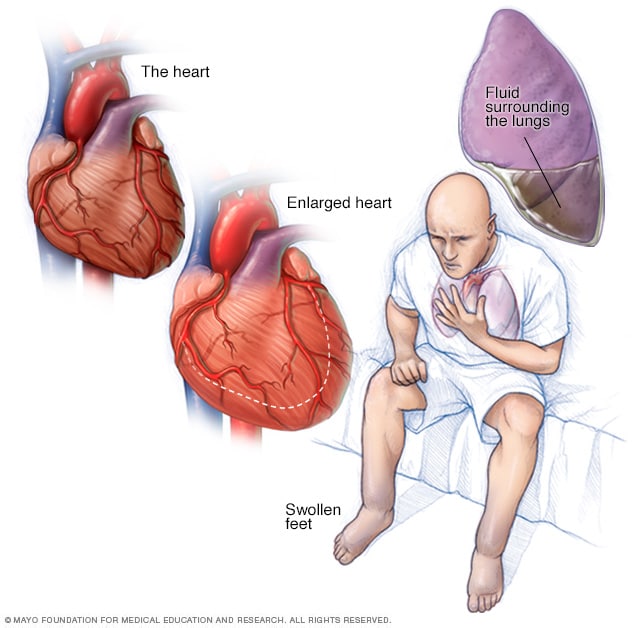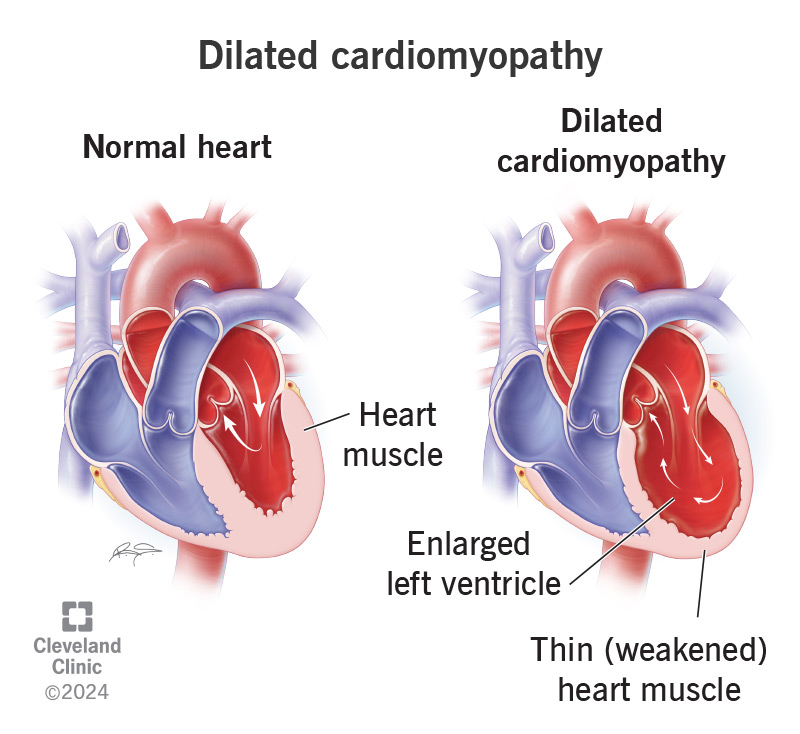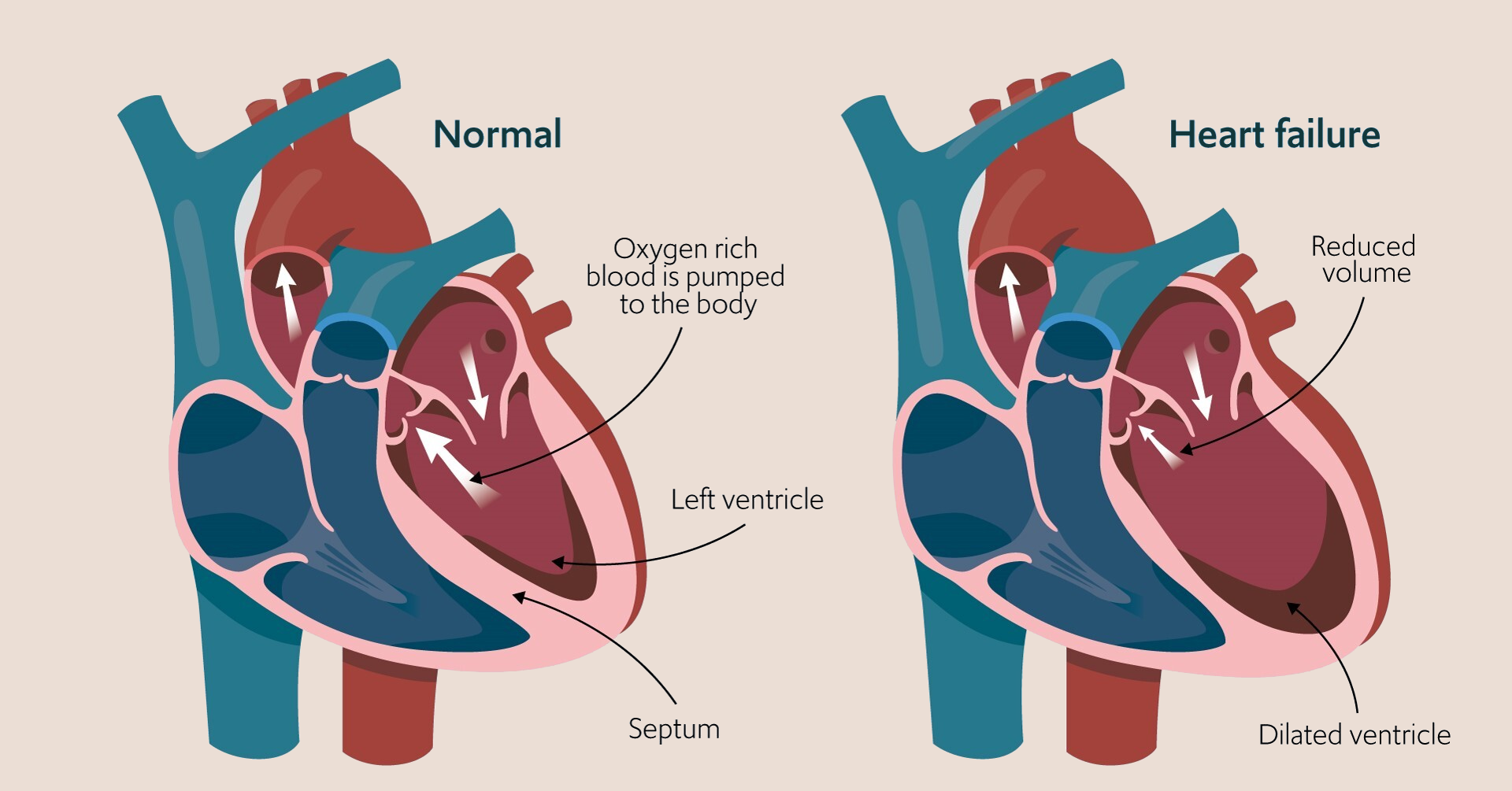Heart failure is a serious condition where the heart can't pump blood effectively. It affects millions worldwide and can lead to severe health issues.
Understanding heart failure is crucial for everyone. Your heart is a vital organ that keeps you alive. When it struggles to pump blood, your body's organs don't get enough oxygen and nutrients. This leads to fatigue, shortness of breath, and other symptoms.
Recognizing these signs early can help manage the condition better. Knowledge about heart failure can also guide you in making healthier lifestyle choices. By learning about this condition, you can take steps to protect your heart and improve your overall health. Stay informed to stay healthy.

Credit: www.mayoclinic.org
Recognizing Symptoms
Heart failure is a serious condition that needs early recognition. Identifying the symptoms can help in timely treatment. In this section, learn about early signs and severe symptoms of heart failure.
Early Signs
Early signs of heart failure can often be subtle and easy to miss. It is important to pay attention to your body and observe any changes.
- Shortness of Breath: This can occur during physical activity or while resting.
- Fatigue: Feeling unusually tired or weak even without exertion.
- Swelling: Noticeable swelling in the ankles, feet, or legs.
- Weight Gain: Rapid weight gain from fluid retention.
If you experience these symptoms, consult a healthcare provider. Early intervention can make a significant difference.
Severe Symptoms
Severe symptoms of heart failure require immediate medical attention. These symptoms indicate advanced stages of the condition.
- Severe Shortness of Breath: Difficulty breathing even when lying flat.
- Chest Pain: Persistent or severe chest pain.
- Confusion: Feeling confused, disoriented, or having difficulty concentrating.
- Persistent Cough: A cough that produces white or pink blood-tinged mucus.
Recognizing these severe symptoms early can save lives. Do not ignore them. Seek medical help immediately if you notice any of these signs.
Diagnosis
Heart failure is a serious condition. Early diagnosis is crucial. It helps in managing symptoms and improving life quality. This section covers how doctors diagnose heart failure.
Medical Tests
Doctors use various tests to diagnose heart failure. These tests help determine the heart's function and structure. Here are some common tests:
- Electrocardiogram (ECG): This test records the heart's electrical activity. It shows any irregular rhythms.
- Echocardiogram: It uses sound waves to create heart images. It shows how well the heart pumps blood.
- Chest X-ray: This test shows the size and shape of the heart. It can reveal fluid in the lungs.
- Blood tests: These tests check for signs of heart failure. They measure levels of certain proteins in the blood.
Doctors may also use a stress test. This test shows how the heart works during physical activity. It helps in understanding the severity of the condition.
Common Misdiagnoses
Heart failure symptoms can be similar to other conditions. This can lead to misdiagnosis. Here are some common misdiagnoses:
| Condition | Reason for Misdiagnosis |
|---|---|
| Asthma | Shortness of breath is a common symptom in both conditions. |
| Chronic Obstructive Pulmonary Disease (COPD) | Coughing and breathing issues overlap with heart failure symptoms. |
| Kidney Disease | Fluid retention can occur in both heart and kidney issues. |
Accurate diagnosis is essential. It ensures that patients receive the right treatment. If you experience symptoms, see a doctor soon. Early detection saves lives.
Lifestyle Changes
Heart failure is a serious condition. Making lifestyle changes can help manage symptoms and improve quality of life. Small adjustments in diet and exercise can have a big impact.
Diet Modifications
A heart-healthy diet is essential. Eating less salt can help reduce fluid buildup. Choose fresh fruits and vegetables. Avoid processed foods. They often contain hidden salt and sugar.
Limit saturated fats. These can raise cholesterol levels. Choose lean meats, fish, and plant-based proteins. Whole grains are better than refined grains. They offer more nutrients and fiber.
Stay hydrated. Drink water instead of sugary drinks. Limit alcohol intake. Too much can strain the heart. Small changes in your diet can make a big difference.
Exercise Recommendations
Regular exercise strengthens the heart. Walking is a good start. Aim for 30 minutes a day, five days a week. You can break this into shorter sessions.
Check with your doctor before starting a new exercise routine. They can suggest safe activities. Gentle exercises like yoga or tai chi are also beneficial. They improve flexibility and reduce stress.
Listen to your body. Rest if you feel tired. Exercise should make you feel better, not worse. Consistency is key. Over time, you will notice improvements in your health.
Medication
Medications are essential for managing heart failure. They help improve symptoms and quality of life. Understanding your prescriptions and how to manage side effects is key.
Common Prescriptions
Doctors often prescribe several types of medications for heart failure. Each serves a specific purpose:
- ACE inhibitors: These relax blood vessels and lower blood pressure.
- Beta-blockers: They reduce heart rate and blood pressure.
- Diuretics: Often called "water pills," they help remove excess fluid.
- Aldosterone antagonists: These help your body get rid of salt and water.
- Digitalis: This medication makes the heart beat stronger and with a more regular rhythm.
Managing Side Effects
Medications can cause side effects. Knowing how to manage them is crucial. Common side effects include:
- Dizziness or lightheadedness
- Cough or wheezing
- Increased urination
- Fatigue or weakness
- Electrolyte imbalance
Discuss any side effects with your doctor. They can adjust your dosage or try a different medication. Staying hydrated and maintaining a balanced diet can also help. It's important to follow your medication schedule. Never stop taking your medication without consulting your doctor.
Monitoring And Tracking
Heart failure is a serious condition. Monitoring and tracking are crucial for managing it. Proper monitoring helps you stay ahead of complications. It also supports your treatment plan. Two key aspects are home monitoring and regular check-ups.
Home Monitoring
Home monitoring involves tracking your symptoms daily. Use a digital scale to check your weight. Sudden weight gain can signal fluid build-up. Keep a record of your blood pressure. High blood pressure can stress your heart.
Monitor your heart rate with a simple pulse check. Note any changes in your symptoms. Shortness of breath, swelling, or fatigue could mean your condition is worsening. Share these details with your healthcare provider. Early detection helps in adjusting your treatment.
Regular Check-ups
Regular check-ups are vital. They allow your doctor to track your progress. During visits, your doctor will review your home monitoring records. They will conduct tests like ECGs or blood tests. These tests provide a deeper look into your heart’s health.
Your doctor may also adjust your medication. They will address any new symptoms or concerns. Regular visits help in early detection of complications. They also keep your treatment plan on track. Schedule check-ups as recommended by your healthcare provider.
Support Systems
Living with heart failure can be challenging. Support systems play a vital role in managing this condition. They provide emotional, physical, and practical help. This section will discuss two main support systems: family involvement and support groups.
Family Involvement
Family involvement is crucial for those with heart failure. Family members can help in many ways. They can remind patients to take their medications. They can also assist with daily activities. This support can reduce stress and improve the patient's quality of life.
Families can also attend doctor appointments. They can take notes and ask questions. This helps ensure the patient understands their treatment plan. Family members can also provide emotional support. They can listen and offer comfort during difficult times.
| Ways Family Can Help | Benefits |
|---|---|
| Medication reminders | Ensures proper treatment |
| Assisting with daily activities | Reduces patient's stress |
| Attending doctor appointments | Improves understanding of treatment |
| Providing emotional support | Offers comfort |
Support Groups
Support groups offer a sense of community. They connect patients with others facing similar challenges. These groups provide a safe space to share experiences and advice. They can help patients feel less alone.
Support groups often have guest speakers. These speakers can be healthcare professionals or other patients. They share valuable information about managing heart failure. Group members can learn new coping strategies.
Some support groups meet in person. Others meet online. Both types have their benefits. In-person meetings offer face-to-face interaction. Online meetings provide convenience and flexibility.
- In-person meetings - Face-to-face interaction
- Online meetings - Convenience and flexibility
Joining a support group can greatly improve a patient's well-being. It offers emotional support and practical advice. It also helps build a sense of community.
Emergency Preparedness
Having a plan in place can save lives during a heart failure emergency. Preparation helps you stay calm and take quick action. This section will guide you through creating an emergency action plan and knowing when to seek help.
Action Plan
Creating an action plan is essential. It ensures everyone knows what to do during a heart failure emergency. Here are the steps to create one:
- Identify Symptoms: Know the signs of heart failure. These include shortness of breath, swelling, and fatigue.
- Medication List: Keep a list of all medications. Include doses and times to take them.
- Emergency Contacts: List phone numbers of doctors, family, and friends. Make sure they are easy to find.
- Medical Information: Have a summary of your medical history. Include allergies and past surgeries.
- Hospital Route: Know the quickest way to the hospital. Practice the route if possible.
When To Seek Help
Knowing when to seek help is crucial. Delaying can make the situation worse. Here are signs that you need immediate medical attention:
- Severe Shortness of Breath: If you can't breathe or speak, seek help.
- Chest Pain: Pain spreading to arms, neck, or jaw needs urgent care.
- Confusion: If you feel disoriented or confused, get help quickly.
- Fainting: Passing out or feeling faint is a red flag.
- Rapid Weight Gain: Gaining more than 2 pounds in a day could signal trouble.
Always keep emergency numbers handy. Call 911 if you experience any of these symptoms.
| Symptom | Action |
|---|---|
| Severe Shortness of Breath | Call 911 |
| Chest Pain | Call 911 |
| Confusion | Call 911 |
| Fainting | Call 911 |
| Rapid Weight Gain | Contact Doctor |

Credit: my.clevelandclinic.org
Long-term Management
Managing heart failure over the long term is crucial. It involves consistent care and staying updated with new treatments. This helps in improving the quality of life and extending life expectancy.
Ongoing Care
Ongoing care for heart failure involves regular check-ups, medication adjustments, and lifestyle changes. Here are some key components:
- Regular monitoring of blood pressure and heart rate.
- Medication adherence to manage symptoms and prevent complications.
- Dietary changes such as reducing salt intake.
- Physical activity tailored to individual capacity.
Doctors may also recommend cardiac rehabilitation programs. These programs provide exercise training and education to support heart health. Regular follow-ups ensure that the treatment plan is effective and adjusted as needed.
| Aspect | Description |
|---|---|
| Medication | Prescribed drugs to manage symptoms. |
| Diet | Low-sodium and heart-healthy foods. |
| Exercise | Low-impact activities like walking. |
| Monitoring | Regular health check-ups and home monitoring. |
Future Treatments
Future treatments for heart failure are evolving. Researchers are exploring new medications and technologies. Some promising areas include:
- Gene therapy to repair damaged heart tissue.
- Stem cell therapy to regenerate heart cells.
- Wearable technology for continuous monitoring.
These innovations aim to offer better management and improved outcomes. Patients and caregivers should stay informed about new developments. Consulting with healthcare providers about emerging treatments can be beneficial.

Credit: guysandstthomasspecialistcare.co.uk
Frequently Asked Questions
What Is Heart Failure?
Heart failure is a condition where the heart can't pump enough blood. It can affect your organs and tissues, leading to various symptoms.
What Are Common Symptoms Of Heart Failure?
Common symptoms include shortness of breath, fatigue, and swelling in the legs. These symptoms can worsen over time.
What Causes Heart Failure?
Heart failure can be caused by coronary artery disease, high blood pressure, or diabetes. These conditions weaken the heart over time.
How Is Heart Failure Diagnosed?
Heart failure is diagnosed through medical history, physical exams, and tests like ECG or echocardiogram. These help assess the heart's function.
Conclusion
Heart failure is a serious health issue. Proper management can improve quality of life. Follow your doctor's advice. Adopt a heart-healthy lifestyle. Eat well and exercise regularly. Monitor symptoms and seek help promptly. Connect with support groups for emotional strength.
Every small step counts. Keep learning about heart health. Stay positive and proactive. Your heart matters.






